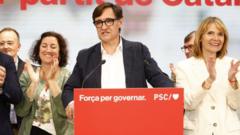3 hours ago
About sharing
The Socialists of Spanish Prime Minister Pedro Sánchez have won Catalonia’s regional election as pro-independence parties lost ground.
The Catalan Socialist Party (PSC), under former Spanish health minister Salvador Illa, made substantial gains to emerge as the clear winner.
With 99% of votes counted, it has secured 42 seats.
Support for independence has dropped to 42%, from 49% in 2017, says the Catalan government’s statistics institute.
In the campaign ahead of this election, the issue of Catalonia’s relationship with the rest of Spain was pushed into the background by other challenges, such as the region’s drought and housing crisis.
The hardline Together for Catalonia (JxCat) party of the former regional president Carles Puigdemont was second, with 35 seats, recovering its status as the primary pro-independence force in the region ahead of the Catalan Republican Left (ERC).
But overall, nationalist parties lost support, meaning they no longer control the regional parliament, in a blow for the independence movement.
Even so, pro-independence parties have wrung substantial concessions from the central government in recent years and continue to demand a referendum on independence.
The minority ERC government of Pere Aragonès called the snap election after failing to gather enough support to pass the region’s annual budget.
Mr Sánchez will see this result as vindication of his policies in Catalonia – in particular, a controversial amnesty law benefiting nationalists who face legal action for separatist activity.
The amnesty, which is concluding its passage through the Spanish parliament, has drawn a fierce backlash from opponents on the right.
Mr Illa hailed the result as “a new era for Catalonia”. He said that among the factors which had secured the result “were the policies implemented by the Spanish government and its prime minister, Pedro Sánchez, to whom I send my acknowledgement and thanks”.
The amnesty law was a condition of the parliamentary support that JxCat and ERC gave to Mr Sánchez in his investiture, allowing him to form a new central government last November.
Mr Puigdemont, who fled abroad in 2017 after leading a failed secession bid, is expected to benefit from the amnesty and return to Spain. He campaigned ahead of this election from the south of France.
Despite the Socialist win, it will not be easy for Mr Illa to form a government, given that he is likely to need the support of ERC and the far-left Comuns Sumar alliance.
Mr Puigdemont called for ERC not to be part of a coalition that included the unionist PSC. Instead, he suggested the two main pro-independence parties should try to form an administration, as they had done in the past before their relationship broke down.
“If ERC is willing to rebuild bridges, so are we,” Mr Puigdemont said.
However, the fragmented nature of the Catalan parliament, which is split by unionist-separatist allegiances as well as a left-right division, is likely to make post-election negotiations lengthy. If a new administration is not formed, there will be a repeat election.
The conservative People’s Party (PP) made substantial gains to become the fourth party in Catalonia, followed by the far-right Vox. By contrast, the self-styled centrists of Ciudadanos lost their representation in the parliament, just seven years after becoming the region’s primary force.
Meanwhile, a new far-right party, Catalan Alliance, won two seats on the back of its uncompromising platform based on separatism and anti-immigrant policies.
29 April
14 March
